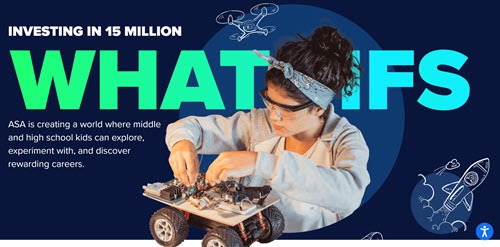BOSTON, MA – Kids today do not feel adequately prepared to make informed, confident decisions about what they want to do after high school. Research shows that more than 65 percent of students feel they would have benefited from more career exploration in middle and high school. An additional study states that less than half of Gen Z respondents said they had enough information to decide what pathway was best for them after high school. To improve career readiness outcomes for students, American Student Assistance® (ASA), a national nonprofit that changes the way kids learn about careers and navigate a path to postsecondary education and career success, today announced the expansion of its free suite of digital resources that advance career readiness by launching EvolveMeTM.
The EvolveMe platform gives teens access to and rewards them for completing high-quality, professional career experimentation activities and building transferable skills they can apply to any job. This is done through interactive online videos, quizzes, games, and mini-lessons or quests that help them develop life skills while enabling them to explore careers, build their networks, and actually experiment with jobs. Through the mobile experience, students are rewarded for completing these tasks and earn points to redeem for gift cards to their favorite retail, restaurant, and/or entertainment brands. They can also track their progress and accomplishments through fun and dynamic visuals within the platform. For instance, they can see their personalized tree grow as it sprouts unique flowers and creatures each time they complete an activity.
Co-created with a nationwide panel of middle and high school teen advisors who provided feedback on design, site features and functionality, and user experience (UX) – alongwith quantitative validation based on feedback from more than 4,600 additional young people, EvolveMe helps kids ages 13-18 prepare for their individual career journeys. Since more than 90 percent of teens have access to smartphones and mobile devices, ASA’s suite of digital experiences provides an equitable way to ensure all youth can explore career possibilities that match their interests — as early as middle school – and test and try in high school. They can access hands-on opportunities, network with career professionals, and build transferable, career-ready skills they’ll need to succeed in the workforce.
To offer a breadth of free, value-added digital resources, job skills and job experiences, ASA is partnering with innovative, mission-aligned nonprofits and companies to provide career-focused tasks featured within the platform. Through EvolveMe, ASA and its initial partners that serve millions of teens, deliver 26 career experimentation and skill-building activities and 79 sub-activities.
EvolveMe tasks include:
- Helping kids understand their strengths and interests as they relate to careers
- Enabling teens to sign up, find and meet with mentors
- Offering games within in-demand areas where kids can build knowledge and skills and try out jobs
- Helping kids learn to interview with confidence by doing mock interviews and receiving instant feedback
- Gaining experience in Scratch and Python coding through free online courses with top coding professionals and project execution
- Learning the essentials of project management
- Accessing career information and getting advice from a supportive community of experienced professionals ready to answer questions about any career
- Learning human interaction skills with the goal of giving every student the tools they need to navigate the complexities of the modern world— in school, at work, and in life
- Acquiring critical thinking and reasoning skills
- Taking a certificate course that allows kids to build knowledge and confidence around financial literacy topics
ASA’s suite of free mobile experiences, which engaged and impacted more than 12 million teens in 2022, also includes Future Network™, a series of original videos that span five categories and follows Gen Z as they explore and learn about different careers from industry professionals; Futurescape®, a mobile-first experience that enables career exploration aligned with teens’ interests; and Next VoiceTM, a digital youth advocacy platform that empowers kids with the durable skills they need to effectively make change for the issues and causes that impact their futures.
About American Student Assistance® (ASA)
American Student Assistance® (ASA) is a national nonprofit changing the way kids learn about careers and navigate a path to postsecondary education and career success. ASA believes all students should have equitable access to career readiness learning, starting in middle school, so they will be equipped to make informed, confident decisions about their futures. ASA fulfills its mission by providing free digital-first experiences, including Futurescape®, Next Voice™, and EvolveMe™, directly to millions of students, and through impact investing and philanthropic support for educators, intermediaries, and others. To learn more about ASA, visit www.asa.org/about-asa.
- Arizona’s Apache Junction Unified School District Supports Innovative Teaching and Learning with New EdTech Resources - April 19, 2024
- AI Educational Partnership to Elevate Classroom Presentations, Assessments - April 18, 2024
- SME Education Foundation Expands Manufacturing and Engineering Opportunities to 15K Additional Michigan Students - April 18, 2024


